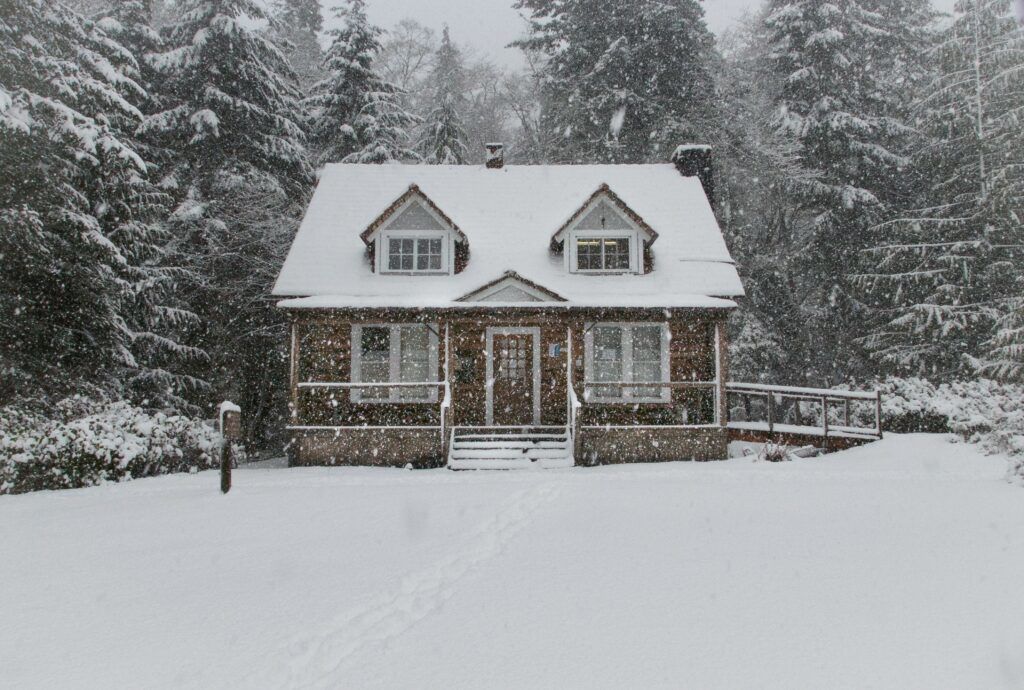When you build a new home with Next Modular, it will be tightly sealed and very well insulated, keeping you warm and cozy without the worry of freezing water pipes. But if you haven’t built your beautiful new home with us yet, you may find yourself in an older home that is drafty, or that has less insulation than you really need to get through those brisk January nights. Learn how to combat damage from ice and snow and prepare your older home for a hard freeze.
Tips for Preparing Your Home for a Freeze
Preventative maintenance is always better than post-damage cleanup. If you have an eye on the forecast and know that a storm is coming, make sure you take the proper precautions. It is best to prepare your home for icy weather by employing the following steps.
Leave your faucets on a slow drip.
Water expands as it freezes, which means the moisture sitting in your pipes often expands and bursts the pipe when left alone in freezing temperatures. To prevent this from happening, keep both your hot and cold water on a slow drip from every faucet in your home. The activity of the water discourages freezing.
Open your cabinet doors to expose pipes.
As an added precaution, open any cabinet (or regular) doors that hide the pipes under your sinks. This allows the heat from your home to “thaw out” the pipes and prevent condensation from freezing.
Prepare to turn off your water (or disconnect hoses).
In the event that your pipes do freeze, immediately turn off your water or disconnect any outside water hoses. If your pipes burst, the last thing you will want to deal with is extra water output. If you plan to be out of town during the freeze and don’t want to leave your faucets on a slow drip, go ahead and disconnect all of your water lines. This will help to prepare your home for a freeze while you’re away.
Keep your furnace running.
In frigid temperatures, it is important to keep your heat on for several reasons. First, if you lose power, you want your home to start with as much heat as possible until it can be fixed. Second, the cold affects your systems as well as your pipes, and the extra heat provides a measure of protection against the weapons wielded by the cold. Additionally, as already mentioned, the furnace plays a large role in keeping your indoor pipes from freezing.
Keep in mind that it’s a good idea to have your furnace professionally inspected before the season turns too cold. This prevents inconvenient breakdowns during subzero temperatures.
Seal your doors and windows to prevent moisture from leaking and freezing.
If your doors or windows allow drafts, condensation will build up inside your home and then refreeze. Unfortunately, left alone, this will freeze windows or sliding door shut. Make sure you use rubber seals or an extra layer of insulation to block drafty areas of your home.
Clean your gutters.
The best time to clean your gutters is right before a hard freeze. If they are full of sticks, dirt, and debris, the ice or snow will freeze over and make the gutter extremely heavy. In turn, the gutter can snap or crack, causing a post-storm headache for you.
Keep your attic well-ventilated.
With your furnace running nonstop, make sure you check your attic for proper ventilation. If poorly ventilated, the hot air rises and pushes against the roof. Snow on the roof melts and slides, refreezing around the edges of the gutters. This becomes a cycle, resulting in “ice dams” on your house that can break and cause serious damage to your roof and gutters.
In the Market for a New Home?
At Next Modular, we know that choosing a home is likely one of the most important financial decisions you will make. As an experienced modular home builder, we are committed to being your guiding light throughout this process. If you need a modular home built near Goshen, Indiana, or if you have any further questions regarding resale value, call us today.


